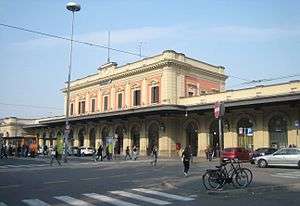Parma railway station
Parma | |
|---|---|
 View of the passenger building in 2007. | |
| Location |
Piazzale Carlo Alberto dalla Chiesa 43121 Parma PR Parma, Parma, Emilia-Romagna Italy |
| Coordinates | 44°48′37″N 10°19′42″E / 44.810271°N 10.328393°ECoordinates: 44°48′37″N 10°19′42″E / 44.810271°N 10.328393°E |
| Operated by |
Rete Ferroviaria Italiana Centostazioni |
| Line(s) |
Milan–Bologna Parma–La Spezia and Sarzana Brescia–Parma Parma–Suzzara |
| Distance |
89.741 km (55.762 mi) from Bologna Centrale |
| Platforms | 4 (serving 8 tracks) |
| Train operators |
Trenitalia Ferrovie Emilia Romagna (FER) |
| Connections |
|
| Other information | |
| Classification | Gold [1] |
| History | |
| Opened | 21 July 1859 |
| Electrified | 1938 |
| Location | |
 Parma railway station Location of railway station in Parma | |
Parma (Italian: Stazione di Parma) is a railway station serving the city of Parma, in the region of Emilia-Romagna, northern Italy. The station opened in 1859 and is located on the Milan–Bologna railway, Pontremolese railway (to La Spezia), Brescia–Parma railway and Parma–Suzzara railway. The train services are operated by Trenitalia, Trenord and Ferrovie Emilia Romagna.
The station is currently managed by Rete Ferroviaria Italiana (RFI). However, the commercial area of the passenger building is managed by Centostazioni. Each of these companies is a subsidiary of Ferrovie dello Stato (FS), Italy's state-owned rail company.
Location
Parma railway station is situated at Piazzale Carlo Alberto dalla Chiesa, at the northern edge of the city centre.
History
The station was inaugurated on 21 July 1859 together with the extension from Piacenza. It is currently being rebuilt to the design of the Spanish architect Oriol Bohigas.
Features
The passenger building is composed of a large central section and two smaller side buildings, connected by corridors. Inside are the ticket office, waiting room and other public facilities, as well as the headquarters of the railway police and the traffic management department. The upper floor is used by Trenitalia.
The station yard has eight tracks used for passenger services. They are served by a total of four platforms, which are equipped with shelters and connected via a pedestrian underpass. The station yard also has a locomotive shed and a turntable.
A short distance from the station, along the line towards Milan, is a goods yard, which is still in use.
Train services
The station is served by the following service(s):
- High speed services (Frecciarossa) Milan - Parma - Bologna - Florence - Rome
- High speed services (Frecciabianca) Milan - Parma - Bologna - Ancona - Pescara - Foggia - Bari - Brindisi - Lecce
- High speed services (Frecciabianca) Milan - Parma - Bologna - Ancona - Pescara - Foggia - Bari - Taranto
- High speed services (Frecciabianca) Turin - Parma - Bologna - Ancona - Pescara - Foggia - Bari - Brindisi - Lecce
- Intercity services Milan - Parma - Bologna - Florence - Rome - Naples - Salerno - Lamezia Termi - Reggio Calabria
- Intercity services Milan - Parma - Bologna - Rimini - Ancona - Pescara - Foggia - Bari - Brindisi - Lecce
- Intercity services Milan - Parma - Bologna - Rimini - Ancona - Pescara - Foggia - Bari - Taranto
- Night train (Intercity Notte) Turin - Milan - Parma - Reggio Emilia - Florence - Rome - Salerno - Lamezia Terme - Reggio di Calabria
- Night train (Intercity Notte) Milan - Parma - Bolgona - Ancona - Pescara - Foggia - Bari - Brindisi - Lecce
- Express services (Regionale Veloce) Piacenza - Parma - Reggio Emilia - Bologna - Rimini - Ancona
- Express services (Regionale Veloce) Milan - Piacenza - Parma - Reggio Emilia - Bolgona (- Rimini)
- Regional services (Treno regionale) Parma - Reggio Emilia - Modena - Bologna
- Regional services (Treno regionale) Brescia - Ghedi - Asola - Piadena - Casalmaggiore - Parma
- Regional services (Treno regionale) Genoa - La Spezia - Aulla - Pontremoli - Fornovo - Parma
- Local services (Treno regionale) Parma - Guastalla - Suzzara
Passenger and train movements
The station has about 8 million passenger movements each year.[2]
Many passenger trains call at the station platforms. They include regional, express, InterCity, Frecciabianca services, and a daily pair of Frecciarossa high speed trains.
The main destinations of the regional trains are Milan, Bologna, La Spezia, Pontremoli and Brescia.
Interchange
The station provides interchange with the Parma trolleybus system, and with urban and suburban buses.
See also
- History of rail transport in Italy
- List of railway stations in Emilia-Romagna
- Rail transport in Italy
- Railway stations in Italy
References
- ↑ List of Italian stations and categories
- ↑ "Flussi Annui nelle 103 Stazioni" [Annual flows at the 103 stations]. Centostazioni website (in Italian). Centostazioni. Archived from the original on February 9, 2010. Retrieved 4 December 2010. External link in
|work=(help)
External links
![]() Media related to Parma railway station at Wikimedia Commons
Media related to Parma railway station at Wikimedia Commons
This article is based upon a translation of the Italian language version as at April 2011.